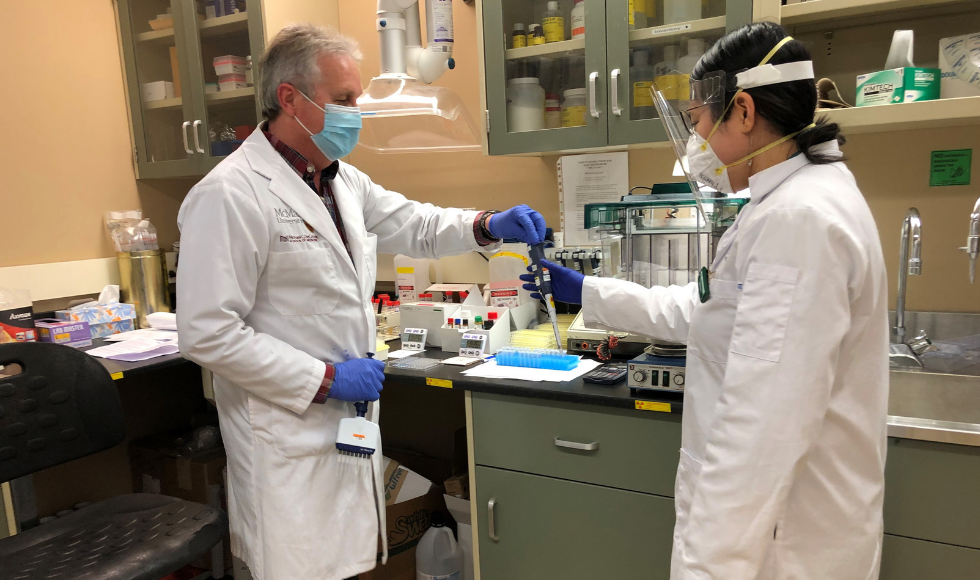Platelet lab becomes national testing centre for vaccine-related clots

Two technicians work in the McMaster Platelet Immunology Laboratory (MPIL). The lab pivoted during the COVID-19 pandemic to diagnose rare blood clot issues induced by COVID-19 vaccines.
November 10, 2021
A grant from the Public Health Agency of Canada has cemented the McMaster Platelet Immunology Laboratory (MPIL) as Canada’s centre for combatting vaccine-related blood clots.
The funds of almost $1.5 million designated the MPIL to provide confirmation and reports of Vaccine-Induced Immune Thrombotic Thrombocytopenia (VITT).
A small number of Canadians have had the condition after receiving the AstraZeneca Vaxzevria vaccine for the COVID-19 virus. Both the AstraZeneca Vaxzevria and Janssen (Johnson & Johnson) vaccines use adenovirus vectors, which, in rare cases, can trigger clotting.
MPIL researchers have been testing patient blood samples collected across Canada ever since they devised diagnostic testing and treatments for VITT, building on their previous experience in tackling heparin-induced thrombocytopenia. The therapy developed by MPIL scientists is a combination of regular anti-clotting drugs and an intravenous immunoglobulin solution.
“This expansion of world-class rapid laboratory testing here in Canada for suspected Vaccine-Induced Immune Thrombotic Thrombocytopenia (VITT) cases will provide expertise to our international partners, and support Canada’s robust vaccine safety surveillance systems,” said Federal Minister of Health Jean-Yves Duclos.
“I commend the McMaster Platelet Immunology Laboratory for their leadership in this area and the contributions they are making to the global fight against COVID-19.”
Ishac Nazy, MPIL scientific director and associate professor of medicine at McMaster University, said, “strong financial support and national backing for science has allowed us to identify, diagnose and treat VITT in a very short time.”
“The lesson is that without strong funding, scientific advances cannot happen at this speed, and this shows what we can achieve when we are well supported,” he said.
“This lab is uniquely positioned as a true translational medical facility; we research disease mechanisms using patient blood samples. This allows us to devise diagnostic testing and new therapies that have already saved patients’ lives.”
Nazy said that while AstraZeneca vaccines have seen decreased use in Canada, the shots are often still used abroad, and foreign labs are not equipped to diagnose and treat VITT.
He added that the MPIL, as Canada’s only full translational blood lab, is, by default, a national hub containing large amounts of samples, allowing them to conduct large-scale research to identify disease trends.
The funding means the MPIL can now help other countries grappling with VITT.
Donald Arnold, co-medical director of the lab, said the MPIL has already handled patient blood samples from Brazil.
“We are well positioned as a national repository of data and the reference laboratory to serve both our country and the world in surveillance, diagnosis and treatment of VITT. Clinicians are still on high alert for clotting caused by adenovirus-vector vaccines,” said Arnold, a McMaster professor of medicine.
“It is a great honour to receive this grant and the designation as the national testing centre — it flows logically from what we did previously.”
The MPIL is also working with both AstraZeneca Canada Inc. and Johnson & Johnson to improve the safety of their vaccines.


